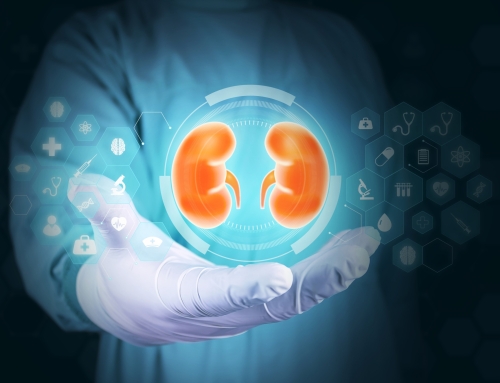As you are being treated for your chronic kidney disease (CKD) Stage 5, there are 2 areas of concern that you and your renal (kidney) care team should discuss.
Diet
Following a renal-friendly diet can help limit the amount of waste in your body, which will aid in your treatment. You and your renal dietitian can work together to monitor the foods you eat and the fluids you drink. Some things you may discuss include
- Limiting fluids
- Avoiding salt
- Being aware of hidden phosphorus
Sticking to the diet you and your dietitian create may not only help you feel better, it may help make your treatments more comfortable, as limiting sodium, and therefore fluids, can alleviate some cramping.
Nutrient Intake
One of the kidneys’ functions is to balance different nutrients in your body. For patients with CKD Stage 5, several nutrients are important to monitor:
- Sodium
- Potassium
- Protein
- Phosphorus
- Calcium
If these nutrients get out of check, serious health problems can occur. That’s why it’s important for you and your kidney care team to check your nutrient levels regularly.
Patients on dialysis have an increased need for protein. Foods high in protein are often high in phosphorus as well.
So it’s important to be aware of what you’re eating and to work with your renal dietitian to create a menu that balances your need for protein with your phosphorus intake.
As you read the rest of the articles in this classroom, you’ll learn more about treating your CKD Stage 5 and how taking an active role in your treatment is one of the most important things you can do
The Power of 3
Hyperphosphatemia can be a serious condition. In fact, watching what you eat and taking a phosphate binder are very important, as is going to dialysis. It takes the power of 3 – diet, dialysis, and medication – to manage chronic kidney disease Stage 5 and high phosphorus levels.
Diet
Making the right food choices, such as eating low-phosphorus foods, can help keep extra phosphorus from building up in your body.
Dialysis
Dialysis cleanses the blood by removing waste and excess fluids that build up. In fact, based on average dietary phosphorus intake, dialysis may remove approximately 50% of the extra phosphorus.
Medication
When diet and dialysis cannot remove enough excess phosphorus, your doctor may prescribe a phosphate binder to help remove the rest.
Your actions — eating kidney-friendly foods, going to dialysis, and taking your medication — can help you get the most from your care.



